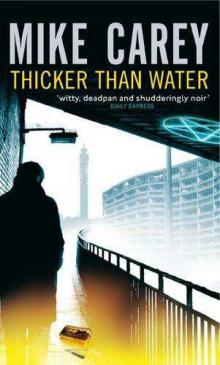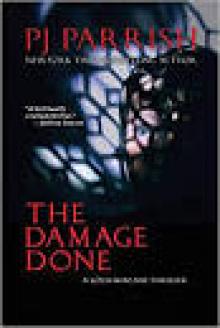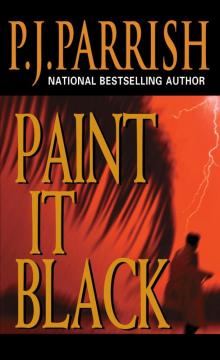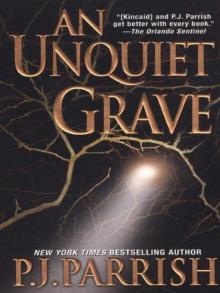- Home
- P J Parrish
South Of Hell lk-9 Page 2
South Of Hell lk-9 Read online
Page 2
On the way back to the living room, he noticed the red message light was blinking on his answering machine. He was tempted to let it go until morning, but it might be a new job offer. Or a message from Joe.
He hadn’t talked to her in a week. It had been three months since she moved to northern Michigan to take the job as undersheriff of Leelanau County. He missed her. Missed the sound of her voice, the feel of her skin against his, the smell of Jean Nate in his sheets.
He hit the button.
But the voice that came from the machine was male. Deep, with a flat southern Michigan timbre.
“Hello… uh… this message is for Louis Kincaid. The PI? You probably won’t remember me, but my name is Jake Shockey, and I’m a homicide investigator with the Ann Arbor PD.”
Louis set the beers down and turned up the machine’s volume.
“You were the responding officer on a missing persons case back in 1980,” the voice went on. “It’s still unsolved, but a few new leads have surfaced, and when I was reviewing your report, a couple of things jumped out at me I’d like to ask you about. You know, the kinds of things we don’t always think were important at the time. So-”
The tape cut off. Louis immediately hit the button for the next message. For a few seconds, there was only the shuffling of papers and the impatient slam of drawers. Then Shockey’s voice again.
“Damn machines,” he said. “Anyway, this is Shockey again. What I was saying was, I would appreciate it if you’d consider coming up to Ann Arbor to help me light a new fire under this case. We’re willing to cough up the airfare and lodging. So, if you could spare the time off from whatever it is you do down there as a PI, let me know. Call me when you get in. Thanks.”
Shockey left his home number and clicked off.
Louis waited, hoping for a message from Joe, but there was nothing else. He walked back to the living room and handed Mel his beer, then dropped back into the chair.
“He sounds like a real charmer,” Mel said.
“Can’t say. I don’t remember him.”
“You remember the case?”
“Not a clue.”
They were quiet. Louis’s eyes went to the muted television again. Now Sonny had some dirtbag in a pink shirt smashed up against a turquoise wall.
“So, you going?” Mel asked.
When Louis didn’t answer, Mel let out a low burp and went on. “Sounds like a pretty good deal to me. Little paid vacation back to A Squared. Stroll around the campus, drink some beer, breathe in the sweet air of youth, relive those moments of reckless adventures and lustful indiscretions. I would give anything to feel twenty again. Wouldn’t you?”
“It was only nine years ago.”
“Right. But tell me it doesn’t feel like another life now,” Mel said.
Louis stood up and walked to the screen door, looking out. It was too dark to see the water, but he could hear the familiar heartbeat of the Gulf in the crashing of the waves, feel its breath in the tangy, salty breeze.
Six months, a year ago… maybe it wouldn’t have felt like another life. But it did now. He felt as if that young man back in Ann Arbor had faded away or even died. And this new man in his place? Far from perfect and riddled with spaces that still needed filling. Yet… this man, this newer him, this man was comfortable in his skin, had made a home for himself on this island. When had that changed? And what had caused it? The nearness of the people he had allowed into his life? Margaret and Sam Dodie, Mel. And Ben, of course, because maybe it took the love of a young boy to help make you grow up.
And Joe…
She was the one who had really saved him.
Louis heard a grunt and turned. Mel had stretched out on the sofa. He was asleep.
Louis took the beer from Mel’s hand and set it on the table. An old throw lay nearby, and Louis laid it across Mel’s legs, knowing he would want it in a few hours when the cooler breezes snuck into the old cottage.
He looked back to the answering machine. Something Shockey had said suddenly registered. Homicide detective. What was a homicide detective doing investigating an old routine missing persons case?
He replayed Shockey’s message, but there was no other information. He paused, then dialed Joe’s home number. For the third time in two days, the answering machine picked up. He listened to the crisp words in her low voice and waited for the beep.
“It’s me again,” he said. “I’m coming north.”
Chapter Three
The air smelled of freshly turned earth. Was it just the wind bringing in the odor of a nearby farm? But Louis didn’t remember there being any fields this close to the city.
That’s what Ann Arbor was now, still a college town, the one he remembered from his four years here. But since he had left, it seemed to have taken on the rigor of a bigger place, with traffic and noise encroaching on the quiet sanctity of the University of Michigan campus.
Louis left the rental car in a lot, thinking a walk to the police station would do him some good after the long trip. Two hours sitting on the ground at the Tampa airport before they finally got in the air. Another lost hour at Detroit Metro while a Northwest clerk tried to find his missing suitcase. It had turned up in San Antonio, and the clerk promised it would be delivered to his hotel that night.
The one sweater he had packed — hell, the one sweater he had kept since moving to Florida — was in the suitcase. And now, as he headed down South University, he zipped his windbreaker to his chin against the chill, thinking maybe he should have driven after all.
A bell tolled. He couldn’t see it, but he knew it was the Burton Tower. He counted three bells. Shit, on top of everything else, he was going to be late. He spotted a phone and dialed the police station.
“Don’t bust your hump,” Shockey said. “Where are you now?”
“By the Law Quad,” Louis said.
“You know Krazy Jim’s?”
“The burger place?”
“Yeah. Meet me there.”
Louis stepped out of the phone booth into a cold drizzle. He hurried across the street and through the stone archway leading into the cloistered confines of the old Law Quad.
He didn’t stop. Neither did the memories.
The cold marble floor of the dining hall where he usually ate alone. The cell-like feel of his dorm room. The sound of his roommate’s drunken snores that drove him to the quiet solitude of the Law Library’s reading room. There, under the fifty-foot vaulted ceiling, there, under the soft glow of the brass lamps, there, under the stained-glass weight of tradition, time seemed to stand still. There, in that vast Gothic cathedral of a place, the ache of loneliness was somehow lessened.
As he neared the western arch, his eyes went up to the old leaded windows of the Lawyers Club. It was where the law students lived. It was where he had so desperately wanted to be.
Once. Another lifetime ago.
He emerged onto State Street, heading west. On Division, he spotted the red awning of Krazy Jim’s Blimpy Burgers. The windows were fogged over, blurring the sign that boasted “Cheaper Than Food.” Inside, a vapor of grease and smoke enveloped him.
Louis spotted a man in a gray raincoat at the front corner table. He was red-faced and beefy, with the kind of hard, darting eyes that could never belong to a college professor. The man stood up as Louis approached.
“Kincaid?”
“Yeah. You Shockey?”
“That I am.” When Shockey held out his hand, Louis caught the glint of his gold detective’s badge and a holstered automatic beneath the raincoat. Shockey’s handshake was hard, his hands rough. Not the hands of a detective who spent long hours at a desk.
“So,” Shockey said, “you remember me now that you’re looking at me?”
Louis took in the pockmarked but roughly handsome face with its coffee-colored eyes and chopped dark hair.
“No, I don’t. Sorry.”
“I remember you,” Shockey said. “I was there the first day you showed up in uniform. We
all wanted to get a look at the poster boy.”
“What?”
“You know, the new cop of the 1980s. Someone who was-”
“Black?” Louis said.
Shockey stared at him, then broke into a crooked-tooth smile. “No, man,” he said. “Someone with a friggin’ college degree.”
Louis let the words just hang there until Shockey cleared his throat. “You hungry?”
The smell of frying onions made Louis’s stomach churn with hunger. “Yeah, I could use a bite,” he said.
“Let’s get in line, then,” Shockey said.
Shockey went to the counter and got a plastic tray. Louis followed suit.
“You know,” Shockey said, “when I looked you up, I was expecting to see attorney-at-law after your name. Kinda surprised to find out you weren’t nothing but a lousy peeper living in a cottage and working insurance crap.”
Louis dug a Coke out of the cooler and slid his tray behind Shockey’s.
“I heard you got kicked out of Michigan a few years back for screwing up some big case the state guys were working on,” Shockey said.
Louis stayed quiet.
“But I guess that just proves what I been saying all along,” Shockey continued. “Police work is all about instinct and guts. Either you got them or you don’t, and you can’t get them from a diploma.”
They had moved up to the griddle, where a big black woman in a white apron and a red head scarf was making hamburgers in a fog of steam.
“Gimme a quint egg on onion roll, Irma,” Shockey said.
The woman grabbed five golf balls of meat, slapped them onto the grill, and smashed them with her spatula. She cracked an egg next to the meat. Then she looked up at Louis.
“Cheeseburger with fries,” Louis said.
The woman pointed the spatula at him. “You need to order the fries first! And the cheese last!”
“What?”
“You heard me.”
Shockey held up a hand. “He’s a virgin, Irma.”
The woman glared at Louis. “Don’t care if he’s a eunuch. Rules is rules.”
Shockey turned to Louis. “What do you want?”
Louis was silent.
“Damn it, what do you want?” Shockey said in a fierce whisper.
“Cheeseburger,” Louis said, staring at the woman with the spatula.
Shockey turned to the woman. “Double on kaiser, Irma.”
She scowled at Louis, slapped two balls onto the grill, and smashed them down.
“I wanted a cheeseburger,” Louis said to Shockey.
“Forget it.”
Shockey slid his tray toward the register, pulling out his wallet.
“What about my fries?” Louis asked.
“Forget them, too.”
A kid in a hairnet deposited two paper-wrapped lumps on their trays, and Shockey paid. They wove through the bodies to the table by the front window. Shockey slid into the wood bench, keeping his eyes on the window and the door. Louis had no choice but to balance his ass on the small wooden swivel chair. His eyes took in the grease-stained walls and battered old tables.
“Why do you come here?” Louis said.
Shockey nodded toward the greasy paper lump. “Try it.”
With a shake of his head, Louis unwrapped the paper and took a bite of the burger. It was delicious. Even without the cheese.
Shockey was still working on his five-patty monster with a fried egg by the time Louis finished his. He was trying to decide whether he wanted to square off again with the griddle woman but decided he would wait to eat dinner later with Joe.
He got a glance at his watch. If he got out of there in the next half-hour, he could still make Echo Bay by ten.
Shockey saw him. “You got somewhere to go?”
“No,” Louis said, wiping his hands with a paper napkin. “So, why don’t you tell me why I’m here?”
Shockey set his burger down and grabbed a napkin. “Like I told you on the phone,” he said, “it’s about a missing persons case. A twenty-four-year-old woman by the name of Jean Brandt was reported missing by her husband December 4, 1980. A BOLO was put out on her ’71 Ford Falcon, which disappeared with her, according to the husband. A week later, when you were on patrol, you spotted the car parked at the Amtrak station down on Depot Street.”
Louis tried to bring the memory back, and it came slowly. It had been an icy night crammed with nuisance calls and fender-benders. He had a habit of rifling through the BOLOs and alerts, hoping to break the boredom of the shift. The old red Falcon was parked in the last space at the train station, pillowed with snow, one of the tires flat. He didn’t remember much else except the license plate. It was hanging, as if someone had tried to take it off but had given up after stripping the screw.
But one memory was clear. The plate had not been from Washtenaw County. It had been from Livingston County, north of Ann Arbor. Which meant that the missing woman’s disappearance would have been Livingston County’s jurisdiction, regardless of where her car was found. So the only way Shockey would be involved now was if her body had turned up in Ann Arbor.
“Where’d you find her?” Louis asked.
Shockey cleared his throat. “What?”
“The body. You guys found it, right?”
“No,” Shockey said.
“What about these new leads? Do you have a witness or something besides the car that connects her to Ann Arbor?”
Shockey pushed his tray away. “Not exactly.”
“So, why are you pursuing a cold case that doesn’t even belong to you?”
Shockey took a moment to grab another napkin and wipe his face. “I’m kind of in charge of the cold cases. This is one that always stuck in my craw. I met the husband, Owen Brandt, when he tried to pick up the Falcon. He was a real scumbag, and he said then he thought his wife had run off on him. My gut always told me he killed her and left the car here to make us think she left the state.”
Louis glanced at his watch.
“I’ll ask you again. You got somewhere to go, peeper?” Shockey said.
Louis looked across the table at Shockey. He was about forty but looked older. And in that moment, everything about the man seemed to crystallize. He was a dinosaur, assigned to brush the dust off a few cold cases while the young cops — the ones with diplomas — were pushing their way up in the ranks. Shockey was hearing their footsteps and was probably fighting like hell to hang on to his gold badge. Solving the case of a missing wayward wife in quiet little Ann Arbor just might help him do that. At least, for a few more years.
Louis knew, too, why Shockey had wanted to meet here instead of at the police station. He didn’t want the other cops to know he had to call on a PI to help him do his job.
“Look,” Louis said, “all I did was spot the vehicle. I sent my report to Livingston. The car was towed, and I was done. What the hell could I offer the case now?”
“You searched the car, right?”
“Of course I did. It was procedure.”
“You search it good?”
“Yeah, I searched it good.”
“You sure about that, peeper?”
What was this? He didn’t need this shit. First, he couldn’t get a cheeseburger, and now this old wash-up was on his case. But even as his body was tensing to get up and move forward, get on the road so he could see Joe, his brain was moving backward.
Back to that night at the train station, standing out in the bone-chilling sleet, chipping at the ice on the door handles so he could look inside the car. The car was unlocked, and he found nothing inside but cigarette butts and an old Arby’s bag. The trunk latch was broken, held closed by a rusted coat hanger. Cold, wet, and miserable, he had run his flashlight over the mess of tools and old newspapers, slammed the trunk shut, and retreated to his squad car to call it in.
He met Shockey’s eyes across the table. The question was still there.
“I didn’t miss anything,” Louis said.
“I sti
ll got the car,” Shockey said. He had the barest grin on his face. It pissed Louis off.
“How about if we go take another look?” Shockey said.
The impound lot was in a neighborhood of trailer parks and storage rental barns out by the airport. Shockey pulled the sedan up to the gates of the razor-wired chain-link fence, got out and hustled to the gates.
Louis watched through the slow sweep of the wipers as Shockey unlocked the heavy padlocks and swung the gate open. Louis was staring at the big yellow sign that shouted beware attack dogs as Shockey slid back into the driver’s seat.
“What about the dogs?” Louis asked.
“There’s no friggin’ dogs,” Shockey said, putting the car into gear.
Once inside the lot, Shockey parked the sedan at the side of a large metal hangar of a building. Louis got out into the cold drizzle.
A low whining noise drew his eyes up, but he couldn’t see anything in the rapidly fading light. The whine grew into an ear-splitting scream as a smudge of lights emerged from the clouds. Louis almost ducked as the jet streaked overhead and was gone.
“This way,” Shockey said.
They walked behind the building, down a row of cars, which seemed to grow older and dirtier the farther they went. They passed some motorcycles, a few boats on trailers, and an old tractor. Then came rows of old refrigerators, bicycles, and a stack of doors. The farther they went into the yard, the rustier and more random the piles of debris became. It was like some old cemetery where the fresh graves still had someone to tend them while the old ones had long been abandoned.
Louis stopped and lifted a plastic-encased tag hanging from a rusty bicycle. Written on it was a case number, a scribbled name, and the year: 1968.
“How long you guys keep this stuff?” Louis asked.
“Forever,” Shockey said, walking on. “A few years back, we had a guy who was awarded a new trial after twenty years in the pen. Lucky us, we still had the evidence, and he was convicted again.”
Louis followed Shockey around the corner of the building. The red Falcon was parked nose-in against the fence. A weather-worn tarp covered the front end, but the wind had blown it up to expose the trunk. Shockey sighed in disgust as he brushed mud and dead leaves from a back window. Then he looked back at Louis.

 South of Hell (Louis Kincaid Mysteries)
South of Hell (Louis Kincaid Mysteries) Thicker Than Water
Thicker Than Water Dead of Winter
Dead of Winter The Damage Done
The Damage Done South Of Hell lk-9
South Of Hell lk-9 A Killing Rain
A Killing Rain Dead of Winter lk-2
Dead of Winter lk-2 Island of Bones
Island of Bones Paint It Black
Paint It Black An Unquiet Grave (Louis Kincaid Mysteries)
An Unquiet Grave (Louis Kincaid Mysteries) She's Not There
She's Not There